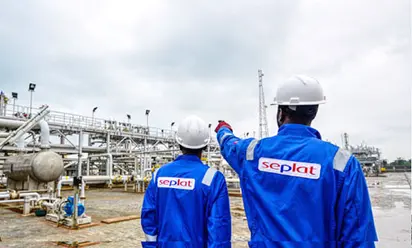Seplat Energy Plc, in partnership with the Nigerian National Petroleum Company Limited (NNPCL), has completed its first domestic supply of Liquefied Petroleum Gas (LPG) – Butane – from the Bonny River Terminal (BRT) in Rivers State, marking an important step toward strengthening energy security and sustainability.
In this operation, 12,600 metric tons (MT) of LPG were delivered to the Nigerian market, shifting the BRT from its traditional role as an export hub and supporting Seplat’s efforts to grow local energy supply while reducing dependence on imported cooking gas.
The supply is part of Seplat’s broader plan to expand domestic gas infrastructure, with two major projects nearing completion: the 300 MMscfd ANOH Gas Plant in Imo State and the 90 MMscfd Sapele Gas Plant in Delta State.
- Both plants include LPG extraction units capable of producing 120MT and 163MT per day respectively and are expected to come onstream in Q4 2025.
By increasing the availability of locally produced LPG, Seplat Energy is improving access to clean cooking fuel and helping to reduce greenhouse gas emissions from traditional biomass sources, which are still used by more than 80% of Nigerian households.
Roger Brown, Chief Executive Officer of Seplat Energy Plc, said:
“Gas and LPG usage is growing rapidly in Nigeria, and reliable domestic supply is essential to achieving energy security, reducing carbon emissions, and improving air quality. At Seplat, we are proud to be at the forefront of this transition, delivering cleaner energy solutions that empower communities and support sustainable growth.”
This stride mirrors the company’s acquisition of Mobil Producing Nigeria Unlimited (MPNU) in Q4 2024, now renamed Seplat Energy Producing Nigeria Unlimited (SEPNU).
After the acquisition:
In Q1 2025, Seplat Energy Plc reported an 11% increase in total production following the acquisition of SEPNU. This was disclosed in the company’s audited financial results for the year ended December 31, 2024.
According to the report, Seplat’s onshore assets averaged 48,618 barrels of oil equivalent per day (boepd) in 2024, a 2% increase from 47,758 boepd recorded in 2023.
- The integration of SEPNU contributed an annualized average of 4,329 boepd, pushing total production to 52,947 boepd.
Following the acquisition, Seplat’s independently audited 2P reserves rose by 85% to 886 million barrels of oil equivalent (MMboe), up from 478 MMboe in 2023.
- The company’s total 2P+2C reserves also increased by 125% to 1,217 MMboe.
According to its H1 2025 results, Seplat’s average daily working interest production jumped to 134,492 boepd, nearly triple the 48,407 boepd recorded in H1 2024.
H1 Performance:
Seplat Energy Plc delivered strong top-line growth in Q2 2025, with revenue surging 206.5% to N939.2 billion, lifting H1 2025 revenue to N2.1 trillion, already 31% above the company’s full-year 2024 revenue.
- This growth was driven mainly by a sharp rise in crude oil production.
Gross profit rose 18% year-on-year to N215.8 billion in Q2, pushing H1 gross profit up 204% to N751.2 billion. While pretax profit jumped 86% year-on-year to N454.1 billion, despite cost pressures in Q2.











